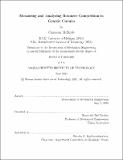Measuring and Analyzing Resource Competition in Genetic Circuits
Author(s)
McBride, Cameron
DownloadThesis PDF (89.15Mb)
Advisor
Del Vecchio, Domitilla
Terms of use
Metadata
Show full item recordAbstract
The field of synthetic biology aims to engineer organisms has shown great promise for exciting applications in fields such as medicine, pharmaceuticals, agriculture, and chemical engineering. However, the design and implementation of genetic circuits is hampered by resource competition between genetic circuit parts, where separate genetic parts become coupled due to individual parts competing for the use of shared cellular resources necessary for the part's function such as ribosomes. These resource competition effects create undesired interactions in genetic circuits and may cause engineered systems to behave unexpectedly, which impedes the design of complex genetic circuits.
This thesis analyzes the effects of resource competition on the behavior of genetic circuits. Using mechanistic mathematical models, we first present a theoretical framework and give conditions to determine when the number of equilibrium points of a dynamical system is subject to change due to state-dependent perturbations, which is applicable to genetic circuits with resource competition. These tools can inform genetic circuit design for improved robustness to resource competition. Next, we develop a method to experimentally measure and predict resource competition in genetic circuits. We propose two key measures of resource competition based on a mathematical model that determine a genetic circuit module's behavior under changes in the availability of cellular resources. Using a special module, called a resource sensor, we experimentally estimate the resource competition measures for any genetic circuit module and are able to accurately predict the circuit's behavior in new contexts. Finally, we analyze the effects of resource competition in biomolecular controllers regulating bacterial population size. We demonstrate that the controller faces a fundamental trade-off making it impossible for the population size to be robust to both resource competition disturbances and environmental disturbances simultaneously. This work enables a better-informed approach to genetic circuit design where resource competition is accounted for, leading to more robust outcomes.
Date issued
2021-06Department
Massachusetts Institute of Technology. Department of Mechanical EngineeringPublisher
Massachusetts Institute of Technology